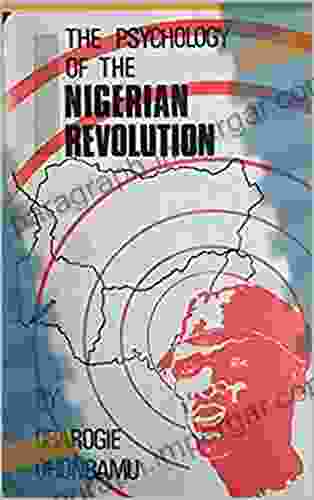The Psychology of the Nigerian Revolution: Unveiling the Hidden Truths of Social Unrest

The Nigerian Revolution, a pivotal moment in the nation's history, remains a subject of fascination and intrigue. Beyond the political and economic factors that contributed to the uprising, there lies a complex web of psychological forces that shaped its course. This article delves into the intricate psychology of the Nigerian Revolution, exploring the motivations, emotions, and cognitive processes that fueled the movement.
4.5 out of 5
| Language | : | English |
| File size | : | 1635 KB |
| Text-to-Speech | : | Enabled |
| Screen Reader | : | Supported |
| Enhanced typesetting | : | Enabled |
| Word Wise | : | Enabled |
| Print length | : | 211 pages |
Collective Identity and Shared Grievances
A shared sense of identity and collective grievances served as the bedrock of the Nigerian Revolution. The people of Nigeria, long subjected to colonial rule and systemic inequality, developed a strong sense of national unity. They identified themselves as a distinct people with a common history, culture, and aspirations. This collective identity became a powerful force that united them against perceived injustices.
Over time, a litany of grievances accumulated, fueling resentment within the Nigerian population. Economic inequality, political corruption, and ethnic tensions created a fertile ground for discontent. The people felt marginalized and deprived, their aspirations for a better future stifled by a system that seemed to work against them.
The Role of Emotion
Emotions played a crucial role in driving the Nigerian Revolution. Anger, frustration, and a deep sense of injustice fueled the movement. The people's patience had worn thin, and they were determined to break free from the chains of oppression. These emotions provided a potent source of energy and determination.
Fear was also a significant factor. Many Nigerians lived in constant fear of government reprisal, arrest, or even death. This fear, however, was counterbalanced by a growing sense of hope and optimism. The people believed that they could overcome the challenges they faced and create a better future for themselves and their children.
Cognitive Processes and the Desire for Change
Cognitive processes, such as perception, cognition, and decision-making, also influenced the course of the Nigerian Revolution. The perception of the government as illegitimate and unresponsive to the needs of the people fueled the movement. Nigerians came to believe that peaceful protests and appeals for change had fallen on deaf ears, leaving them with no choice but to resort to more drastic measures.
The desire for change became a powerful motivator. The people of Nigeria yearned for a society that was more just, equitable, and responsive to their needs. They believed that a revolution was the only way to achieve these goals. This desire for change provided the necessary impetus to sustain the movement in the face of adversity.
Implications for Understanding Social and Political Change
The psychology of the Nigerian Revolution offers valuable insights into the dynamics of social and political change. It demonstrates how collective identity, grievances, emotions, and cognitive processes can play a significant role in shaping revolutionary movements. By understanding these factors, we can better comprehend the causes and nature of social unrest and develop more effective strategies for addressing them.
Moreover, the Nigerian Revolution highlights the importance of addressing the underlying psychological needs and aspirations of the people. Governments that fail to listen to the voices of their citizens and meet their legitimate grievances risk creating conditions that can lead to social unrest and revolution.
The Nigerian Revolution was a complex and multifaceted event that was deeply influenced by psychological factors. A shared sense of identity, collective grievances, powerful emotions, and a desire for change propelled the movement forward. Understanding the psychology of this revolution provides valuable lessons for understanding social and political change and for shaping more just and equitable societies.
4.5 out of 5
| Language | : | English |
| File size | : | 1635 KB |
| Text-to-Speech | : | Enabled |
| Screen Reader | : | Supported |
| Enhanced typesetting | : | Enabled |
| Word Wise | : | Enabled |
| Print length | : | 211 pages |
Do you want to contribute by writing guest posts on this blog?
Please contact us and send us a resume of previous articles that you have written.
 Book
Book Novel
Novel Page
Page Chapter
Chapter Text
Text Story
Story Genre
Genre Reader
Reader Library
Library Paperback
Paperback E-book
E-book Magazine
Magazine Newspaper
Newspaper Paragraph
Paragraph Sentence
Sentence Bookmark
Bookmark Shelf
Shelf Glossary
Glossary Bibliography
Bibliography Foreword
Foreword Preface
Preface Synopsis
Synopsis Annotation
Annotation Footnote
Footnote Manuscript
Manuscript Scroll
Scroll Codex
Codex Tome
Tome Bestseller
Bestseller Classics
Classics Library card
Library card Narrative
Narrative Biography
Biography Autobiography
Autobiography Memoir
Memoir Reference
Reference Encyclopedia
Encyclopedia Jim Butcher
Jim Butcher Jenn Bishop
Jenn Bishop Jessica D Findley
Jessica D Findley Joan Lachkar
Joan Lachkar Jeremy Camp
Jeremy Camp Jessica Samuel
Jessica Samuel Jerry Brotton
Jerry Brotton Jill Savage
Jill Savage Jo Usmar
Jo Usmar Joe Copalman
Joe Copalman Jiahong He
Jiahong He Joe Griffin
Joe Griffin Jen Karetnick
Jen Karetnick Jimmie James Jr
Jimmie James Jr Jim Campbell
Jim Campbell Jm Balbuena
Jm Balbuena Jeremy Armstrong
Jeremy Armstrong John A Tracy
John A Tracy Jill A Grimes
Jill A Grimes John A Coxhead
John A Coxhead
Light bulbAdvertise smarter! Our strategic ad space ensures maximum exposure. Reserve your spot today!

 Morris CarterDiscover the Art of Checkmating: Master Fundamental Checkmates with Our Book
Morris CarterDiscover the Art of Checkmating: Master Fundamental Checkmates with Our Book
 Floyd RichardsonEmpowering Families in the Fight Against Tobacco: A Comprehensive Guide to...
Floyd RichardsonEmpowering Families in the Fight Against Tobacco: A Comprehensive Guide to... Cason CoxFollow ·4.4k
Cason CoxFollow ·4.4k VoltaireFollow ·10.7k
VoltaireFollow ·10.7k Chandler WardFollow ·19.7k
Chandler WardFollow ·19.7k Jamal BlairFollow ·17.9k
Jamal BlairFollow ·17.9k Federico García LorcaFollow ·9.5k
Federico García LorcaFollow ·9.5k Xavier BellFollow ·19.8k
Xavier BellFollow ·19.8k Derrick HughesFollow ·7.2k
Derrick HughesFollow ·7.2k Devin CoxFollow ·7.7k
Devin CoxFollow ·7.7k

 Christian Barnes
Christian BarnesUnleash Your Creativity: Build Interlocking 3D Animal and...
Discover the Art of Paper...

 Terry Bell
Terry BellUnveiling the Secrets of Winning: A Comprehensive Guide...
In the realm of chance and fortune, the...

 Albert Camus
Albert Camus101 Things That You Should Do Before Leaving The House In...
Starting your day right is...

 Anthony Burgess
Anthony BurgessForcing Move 2024 Volume: Unleash Your Inner Grandmaster
Embark on an extraordinary chess...
4.5 out of 5
| Language | : | English |
| File size | : | 1635 KB |
| Text-to-Speech | : | Enabled |
| Screen Reader | : | Supported |
| Enhanced typesetting | : | Enabled |
| Word Wise | : | Enabled |
| Print length | : | 211 pages |












